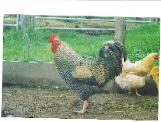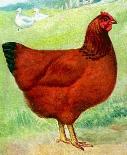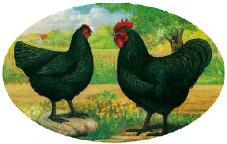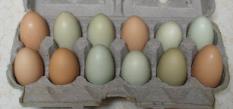The Canoga Creek Farms flock of chickens lays jumbo, medium and mini eggs. A carton of a dozen eggs will include all shades of brown, blue and white from a soft creamy white to dark russet with speckles and robin's egg blue Our hens and roosters live well - heated water bowls and heat lamps in the winter and cool water and fans in the coop in the summer. They all have access to the outdoors when they want and are allowed to free-range most days. Our chickens are not de-beaked. Rhode Island Reds are the main producers with Aracaunas, Black Javas, White Javas, Buff Orpintons, Dominiques, and Buff Brahma Bantams helping to fill up the egg basket daily. We also have a few rare breeds contributing to egg production. Eggs are washed, sanitized and refrigerated to ensure you receive our best quality product. |



| Answers to 10 frequently asked questions about eggs 1. How long are eggs good for after I take delivery? Answer: Two Weeks. We recommend that eggs be consumed within 2 weeks after the date received and always refrigerated. We can assure the highest quality for 2 weeks after the delivery date because we give a 30 day "sell by" date with each carton, rather than the 45 day "expiration" date used by most other egg producers. 2. Why are some hard cooked eggs difficult to peel? Answer: They are too fresh. Fresh eggs may be very difficult to peel after they are boiled. Those eggs that have been kept in the refrigerator for a week to 10 days before cooking will usually peel more easily. Hard boiled eggs are usually good for up to one week AFTER they have been hard boiled, provided they are still in the shell and have been kept refrigerated. 3. Can eggs be frozen? Answer: Yes, but NOT in their shells. Hardcooked eggs will have tough whites. The best answer I have heard on freezing eggs is to do this: Break however many eggs you want to freeze into a bowl and mix together. Pour egg mix into plastic ice cube trays and freeze overnight. The next morning, transfer to freezer baggies. 2 frozen egg cubes equals 1 egg. Always thaw the egg in the refrigerator before using. Wash out the ice cube tray with hot soapy water after having the raw egg in it. 4. What is the difference between brown and white shelled eggs? Answer: While there is no nutritional difference between regular white and brown eggs, many people believe brown eggs do taste better. Brown eggs are more expensive to produce because they come from brown chickens, which are heavier chickens than white chickens. And heavier chickens cost more to feed. 5. Are Canoga Creek Farms eggs fertile? Answer: Well, no, not usually. We generally do not keep roosters with the hens so there is usually no way our eggs would be fertilized, therefore no embryo could be formed in our eggs. However, our show stopping rooseter does occassionally get in the hen house... 6. What are the stringy white pieces in egg whites? Answer: These rope-like strands of egg white, called chalazae (ka-LAY-zee), are not imperfections or beginning embryos but a natural, edible part of the egg. They help to keep the yolk centered in the thick white. They are more noticeable when the eggs are very fresh. 7. What goes into the chicken feed Canoga Creek Farms use to feed chickens? Answer: Natural grains grown by local family farmers. Our chicken feed is made with freshly ground corn and soybean meal, some grown here or on neighboring farms, as well as wheat & milo. Grains make up almost all of the chicken feed. A small amount of nutritional vitamin premix (just like a vitamin pill taken by people) is also added to help keep the chickens healthy and happy. A small amount of ground-up oyster shell and crushed lime can be added as well to help make the egg shells strong, and to help the chickens digest the grains better. Canoga Creek Farms NEVER add growth hormones to our chickens feed to over stimulate to lay more eggs. The happiness and welfare of our chickens is always our priority. 8. How many medium eggs should be used in recipes (which are always set to require large eggs)? Answer: When a recipe calls for more than 2 eggs, care must be taken to use the correct amount of eggs. For 3 large eggs, use 4 medium eggs. For 4 large eggs use 5 medium eggs. For 10 large eggs, use 12 medium eggs. 9. How do Canoga Creek Farms house their chickens? Answer: The chickens are kept in open-style barns with nests. . Eggs from "Free-Roaming" farms cost much more than regular eggs because the eggs must be gathered by hand from the individual hen's nest. All of our chickens are kept in a humane and friendly environment. Plenty of fresh water, fresh air, and fresh feed are available to each chicken at all times, with plenty of space for each chicken to move about and socialize with the other chickens. If the chickens are not happy, they will not lay eggs, so it is in our economic best interest to always make sure that all of our chickens are happy and well cared for at all times. 10. Which came first, the chicken or the egg? Answer: According to the Bible, the chicken came first. "And the evening and the morning were the fourth day. And God said, "Let the waters bring forth abundantly the moving creature that hath life, and fowl that may fly above the earth in the open firmament of heaven." Genesis 1:19-20 |


Canoga Creek Farms All Natural Eggs